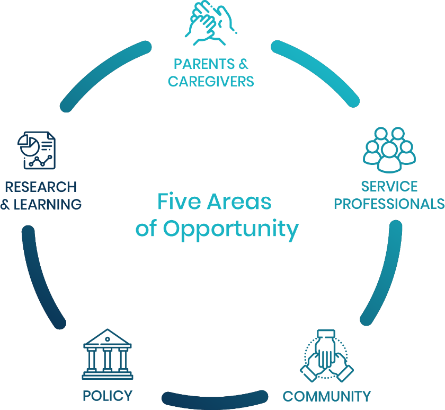States nationwide increasingly recognize the impact of adverse childhood experiences (ACEs) on their communities, families, businesses, and workplaces. ACEs include all types of abuse, neglect, and other potentially traumatic experiences for children and youth under the age of 18. These exposures are linked to greater potential for risky health behaviors, chronic health conditions, and early death. With this understanding, states like Tennessee, Wisconsin, and Washington, have launched coordinated efforts to promote well-being through the adoption of trauma-informed approaches and strategies that prevent ACEs and mitigate its effects.
In New Jersey, where one of every three children will be exposed to ACEs over the course of childhood, three funders — The Burke Foundation, The Nicholson Foundation, and the Turrell Fund — have formed the New Jersey Funders ACEs Collaborative (the Collaborative) to advance a coordinated statewide response to tackle this issue. This unique collaboration is committing significant resources to reduce early life stress and promote positive life trajectories for all children in the state. Although these efforts are New Jersey-based, lessons from the statewide initiative can inform activities in other states.
Identifying Opportunities to Take Action
As a foundational step, the Collaborative commissioned a comprehensive analysis to better understand the impact of ACEs in New Jersey and identify the best areas to take action. The consulting firm FSG reviewed research, examined activities in other states, and conducted interviews of community leaders, nonprofit professionals, academic researchers, and policymakers. Insights from this research are synthesized in a recently released report: Adverse Childhood Experiences: Opportunities to Prevent, Protect Against, and Heal from the Effects of ACEs in New Jersey.
 The report identifies five key areas of opportunity for taking action to address the prevalence of ACEs and mitigate lasting effects on children’s health and well-being:
The report identifies five key areas of opportunity for taking action to address the prevalence of ACEs and mitigate lasting effects on children’s health and well-being:
- Support parents and caregivers.
- Provide training and professional development in trauma-informed care.
- Promote community awareness of ACEs.
- Advance policies and practices that help children and families thrive.
- Collect, analyze, and share data and findings from research and practice.
Developing a Plan of Action
The report outlines an ambitious set of goals and serves as a starting point for a statewide discussion about addressing ACEs across New Jersey. As a next step, the Center for Health Care Strategies (CHCS), with support from the Collaborative, will bring together stakeholders across the state to develop a statewide plan to address, prevent, and mitigate the impact of ACEs. In collaboration with its human-centered design facilitation partner Looking Glass Strategy, CHCS will convene a series of focus groups with key constituencies — health care, education, business, child and family services, policymakers, law enforcement and the judicial system, communities, and families — whose perspectives are central to building a comprehensive approach to addressing ACEs. While these efforts are New Jersey-specific, other states across the country may learn from the statewide agenda being undertaken to address ACEs. Look for updates from CHCS in the future.
Related Resource
Adverse Childhood Experiences: Opportunities to Prevent, Protect Against, and Heal from the Effects of ACEs in New Jersey – This report identifies key areas of opportunity to address the prevalence of ACEs and mitigate lasting effects on children’s health and well-being.





I would like to talk with you regarding the policies and practices that you will be using to help children and families thrive (opportunity #4). I have been active with local communities in this work and developed a curriculum, Mind Matters: Overcoming Adversity and Building Resilience to deal with these issues.